|
|
|
Sort Order |
|
|
|
Items / Page
|
|
|
|
|
|
|
| Srl | Item |
| 1 |
ID:
152866
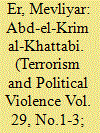

|
|
|
|
|
| Summary/Abstract |
Abd-el-Krim al-Khattabi's guerilla tactics are said to have influenced several renowned revolutionaries, such as Ho Chi Minh and Mao Zedong. There is evidence that Che Guevara equally employed at least some of the tactics and methods, which were devised by the Rifis. After all, Alberto Bayo, the much respected guerilla trainer of Che, had fought during his military career for a relatively long period of time against the Rifis. Castro, yet another role model for Che, mentions in his biography that he read about the battle of Annual, one of the most successful attacks against the Spanish initiated by Abd-el-Krim in 1921. There are also claims that Che had met Abd-el-Krim in 1959 in Cairo. Castro does not mention that he had discussed with Che anything about his readings on the Rif War, but he clearly states that Bayo used to teach in his camp guerilla methods that he had encountered during his assignments in Morocco. However, neither Bayo nor Che (or their biographers) mention that any of the tactics imparted during the training were from the time of Abd-el-Krim's struggle. The only person praised by both men is the Nicaraguan rebel leader Augusto César Sandino. This article compares the tactical teachings of Bayo as well as the operational methods used by Che during his battles in Cuba with the methods applied by the Rifis under Abd-el-Krim's leadership, and highlights a number of tactical similarities. It also finds that the guerilla tactics applied by Sandino have little in common with the methods described by Bayo.
|
|
|
|
|
|
|
|
|
|
|
|
|
|
|
|
| 2 |
ID:
132032
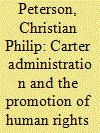

|
|
|
|
|
| Publication |
2014.
|
| Summary/Abstract |
This article will examine the effectiveness of the Carter administration's efforts to promote human rights in the Soviet Union. It will pay particular attention to how human rights promotion fit into a larger approach to transforming Superpower relations in ways favorable to U.S. interests called "reciprocal accommodation [détente]." The use of this framework provides an excellent way to tease out the complexities of how the administration balanced the promotion of human rights in the USSR with other important objectives such as concluding the SALT II treaty. It also helps reveal how executive branch worked to reduce Soviet human rights violations by citing the provisions of the Final Act and working with private citizens to raise international awareness about human rights issues. Without losing sight of his administration's inability to protect Soviet dissenters from arrest and harassment, this article will demonstrate that Carter had every intention of making the issue of human rights an important element of Cold War competition and implementing a new approach to détente that at least in part aimed at transforming Soviet internal behavior.
|
|
|
|
|
|
|
|
|
|
|
|
|
|
|
|
| 3 |
ID:
038691
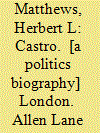

|
|
|
|
|
| Publication |
London, Allen Lane the Penguin press, 1969.
|
| Description |
325p.Hbk
|
| Contents |
Includes bibliography, index.
|
|
|
|
|
|
|
|
|
|
|
|
Copies: C:1/I:0,R:0,Q:0
Circulation
| Accession# | Call# | Current Location | Status | Policy | Location |
| 003137 | 923.17291/MAT 003137 | Main | On Shelf | General | |
|
|
|
|
| 4 |
ID:
106330
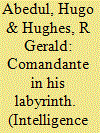

|
|
|
| 5 |
ID:
125206
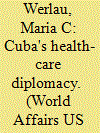

|
|
|
|
|
| Publication |
2013.
|
| Summary/Abstract |
For decades Cuba has exported workers to the developing world as "missionaries for the Cuban Revolution." Usually sent on two-year tours, they are predominantly health professionals, although teachers, sports trainers, engineers, architects, and other specialists also serve. The goal is to earn hard currency and advance other financial goals of the regime while gaining influence, prestige, legitimacy, and sympathy abroad.
|
|
|
|
|
|
|
|
|
|
|
|
|
|
|
|
| 6 |
ID:
122122
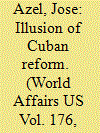

|
|
|
|
|
| Publication |
2013.
|
| Summary/Abstract |
The 2006 succession from Fidel Castro to his brother Raúl, programmed since the early days of the Cuban revolution, was efficient, effective, and seamless. The eighty-two-year-old Raúl, who recently announced that he will step down in 2018, is now orchestrating his own succession behind the scenes. But however the transition from the Castro era plays out, one outcome is off the table: that Raúl will emerge as a reformer to end the Communist era and inaugurate a new democratic and market-oriented Cuba.
|
|
|
|
|
|
|
|
|
|
|
|
|
|
|
|
| 7 |
ID:
152890
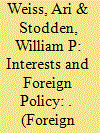

|
|
|
|
|
| Summary/Abstract |
In this article, we test one explanation of the causes of adoption of destabilization as a foreign policy. Destabilization, a risky policy which targets the political leadership of another sovereign state, is a widely-used foreign policy practice. But under-conceptualization, specifically around the causes of destabilization, has thus far limited its use in scholarly analysis of foreign policy. This paper aims to remedy that deficiency. Building on Taliaferro's (2004) balance-of-risk theory, we examine the rapid decay and adoption of destabilization in relations between the US and Cuba as a critical empirical test of this theory. We argue that the risky decision to adopt destabilization is the result of perceived crisis of security, economic and ideological interests. Our findings have implications for other scenarios and times, because they provide a better understanding of destabilization as a practice of governments against one another.
|
|
|
|
|
|
|
|
|
|
|
|
|
|
|
|
| 8 |
ID:
038735
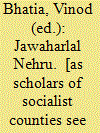

|
|
|
|
|
| Publication |
New Delhi, Panchsheel Publishers, 1989.
|
| Description |
vi, 131p.Hbk
|
|
|
|
|
|
|
|
|
|
|
|
Copies: C:1/I:0,R:0,Q:0
Circulation
| Accession# | Call# | Current Location | Status | Policy | Location |
| 032481 | 923.254/BHA 032481 | Main | On Shelf | General | |
|
|
|
|
| 9 |
ID:
111564
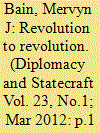

|
|
|
|
|
| Publication |
2012.
|
| Summary/Abstract |
It has traditionally been assumed that the relationship between Moscow and Havana commenced with the victory of the Cuban Revolution. Although it subsequently developed to unprecedented levels, this article examines the relationship in the period between the Russian and Cuban Revolutions. This analysis is conducted within the framework of Soviet policy towards the Developing World and the realist paradigm of International Relations theory. Prior to January 1959, the Kremlin took a considerable interest in Cuba and did not suffer from "geographical fatalism" as has previously been presumed. This is important in itself, but also for the relationship that rapidly developed in the aftermath of the Cuban Revolution as a number of factors that were important in the pre-1959 relationship would also be significant after 1959. Furthermore, this analysis is also important for the contemporary bilateral relationship as both governments have made increasing reference to the multifaceted relationship that existed priorx to 1959.
|
|
|
|
|
|
|
|
|
|
|
|
|
|
|
|
|
|
|
|
|